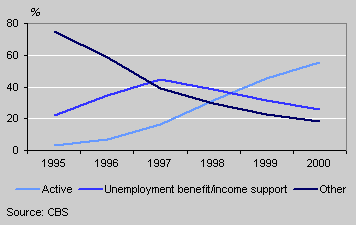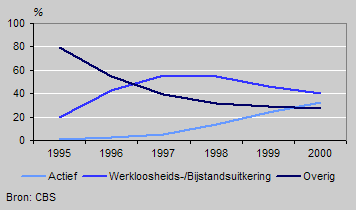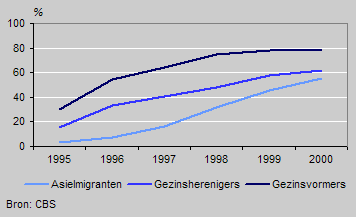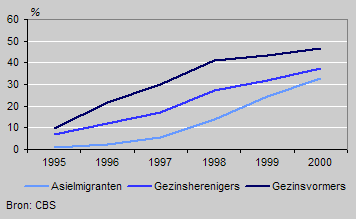Half of asylum migrants have work within five years

HHalf of adult asylum migrants who settled in the Netherlands in the mid-nineties had a job five years later. Fifty-percent of male asylum migrants found work within five years, compared with one-third of female asylum migrants.
Male asylum migrants by labour market position

Asylum migrants from former Yugoslavia are most successful on the labour market. Two out of three Yugoslav men who arrived in the Netherlands in 1995 had a job in 2000. Less than half of men from Iraq, Iran and Somalia had a job in 2000.
Female asylum migrants by labour market position

Less dependent on benefits in the course of time
Two years after arriving in the Netherlands, half of asylum migrants receive unemployment benefit or income support. For women this percentage is 55, for men it is 45. In the course of time their dependence on benefits decreases. After five years only one quarter of male and 40 percent of female asylum migrants still received a benefit.
On the longer term the dependence on benefits decreases even further. Two-thirds of asylum migrants who arrived in the Netherlands in the early nineties had a job after ten years, and less than 20 percent received a social benefit.
Residence permit important
Family reunion and (especially) family formation immigrants usually find a job sooner than asylum migrants. This is partly because of the lengthy asylum procedures, and because asylumseekers may work only a restricted bases if they do not have a residence permit. Once they are granted permission to stay, however, they catch up quickly on the labour market.
Employment among male immigrants by reason for migration

Employment among female immigrants by reason for migration

Recent immigrants have improved their labour market position relatively more quickly than earlier immigrants. This is probably connected to the favourable economic climate in the second half of the nineties.
Arno Sprangers (CBS) en Aslan Zorlu (University of Amsterdam)